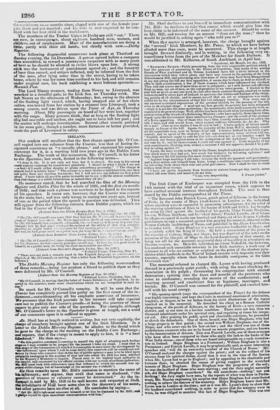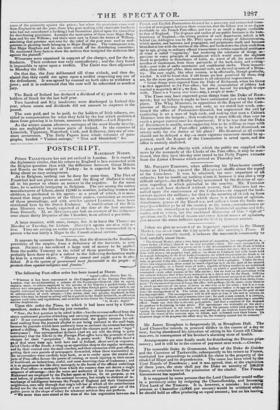The Irish Court of Exchequer was occupied from the I
I th to the 14th instant with the trial of an important cause, which appears to have excited unusual interest throughout Ireland. The case is thus stated by the Dublin correspondent of the- Times. " The Reverend John Patrick Lyons, parish priest of Kilmore, in the barony of Erris, in the county of Mayo (well-known in London as the individual whose exertions wen: so successful in promoting subscriptions for the relief of the starving inhabitants of Erris in the famine of ISOO and 1831), has brought an action for libel against the landlord of his parish, Major Dennis Bingham, Ids son, William Bingham, and his chief driVer,' Patrick Lavelle, all of whom he alleges conspired to incite one hundred and thirty-six of his Roman Catholic parishioners to sign a memorial against him praying his removal, directed to the Roman Catholic sign of Team, and published in the Mayo Constitution in October 1831. Major Bingham is a very extensive landholder in Mayo, and is popularly called the King of Erris. He held a commission of the peace in the counties of Galway, Sligo, and Mayo; but was deprived of the lotto-on the accession of the Marquis of Sligo to the Lord-Lieutenancy of that county, as being too old fur the necessary magisterial duty of travelling in attendance on Quarter-sessions, &c. He is the individual on whom Wakefield, the historian, has conferred such unenviable notoriety in his Irish statistics; a work easy of reference to all who are curious or sceptical on the point of the absolute juris- diction which landlords in the West N.S Ireland exercise with impunity over their tenantry, especially where their farms lie desirably contiguous, as Sir Giles Overreach says." The memorial referred to charged Mr. Lyons with having produced discord in a previously quiet parish ; with using the most shocking de- nunciation in his pulpit ; threatening his congregation with eternal damnation ; spitting into the faces and mouths of the penitents who came to confession ; revealing the secrets of the confessional ; and exacting unusual and exorbitant fees at baptisms, marriages, and burials. Mr. O'Connell was counsel for the plaintiff, and exerted him- self with his usual energy.
" His opening speech (says the correspondent of the Times) for the defence was highly interesting; and kept the Court in continual emotions of admiration, laughter, or disgust, as he set before them his vivid illustrations of the topics touched on in the memorial. He described his client as a Roman Catholic clergyman' of the parish of Kilmore, in the barony of Erris—a very extensive , district, and at one time in a lawless condition. There were not less than ten thousand inhabitants under his spiritual care, and requiring at times his tempo- ral aid. After praising his public spirit and charitable exertions, he proceeded to sketch the defendants. One of them, he said, was Major Bingham, who had a large property in that parish ; the second was William Bingham, son of the Major, and who never can be his heir-at-law; and the third was one of those multifarious creatures who are to he found on remote properties, and are known • by the denomination of drivers. This was Patrick Lavelle, one of those scourges who have often been compared to those who apply the lash to the backs of the • West India slaves—one of those who are found indispensable on a rack- rentedes* tate in Ireland. Major Bingham is a Protestant; William Bingham is also a Protestant; and Patrick Lavelle, it maybe prophetically said, as some interesting speeches end, ' will die an unworthy member of the Church of Rome.' Mr. O'Connell analyzed the charges against the priest; and on the subject of his absence from-his spiritual duties, stated that it was in the time of the famine when Mr. Lyons had to go to England ; and by appealing to the charitable and humane there, he obtained the means of giving support to the wretched tenants of Major Bingham. Major Bingham was the proprietor of the soil; hewasthelandlord of those who were starving; and the Jury might naturally ask,..did Major Bingham contribute? He did contribute—nothing ! not one farthirq;! the Jury might have seen, by the reports of what was done in Parlisi. went? Mr. Stanley expressing his surprise that Major Bingham had contributed - nothing to relieve the distress of his tenantry. Maier Bingham knew that Mr. Lyons was in London at the time; and as it was Mr. Lyons's duty to show that the landlord contributed nothing, in order to prove that the tenantry were in. want, he was obliged to. mention this fact of Major Bingham. This was one cause of the animosity against the priest ; but when the provisions came over from England to aid the poor, those who gave nothing (the charitable landlords who had not contributed a farthing) had themselves placed upon the committee for distributing provisions. Amongst the most active of these were Major Biug- &am and his son William; and there were now in Court the letters of William, .admitting that potatoes sent over fur the relief of the poor were used as seed- potatoes in planting lands belonging to Major Bingham. The consequence was, at Major Bingham and his son were struck off the distributing committee. lie mentioned these facts to show the motives that instigated the malicious libel -against the plaintiff."
Witnesses were examined in support of the charges, and for the de- fendants. Their evidence was very contradictory ; and the Jury found -it impossible to agree upon a verdict. The Court was then adjourned to Monday the 16th.
On that day, the Jury deliberated till three o'clock, and then de. .elared that.they could not agree upon a verdict respecting any one of the defendants. It was agreed by counsel on both sides to withdraw a juror; and it is understood that the case will be submitted to another fury.



















 Previous page
Previous page